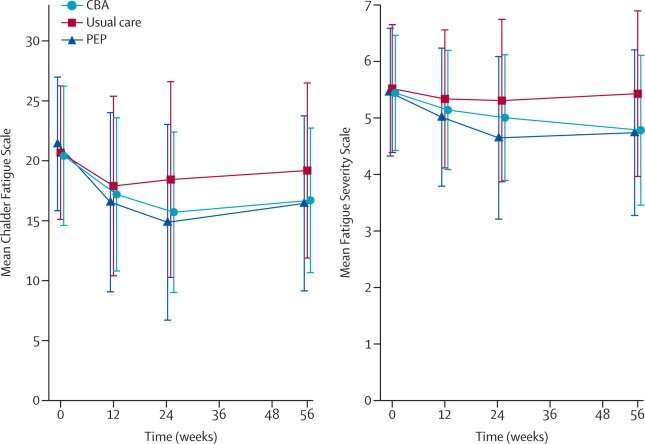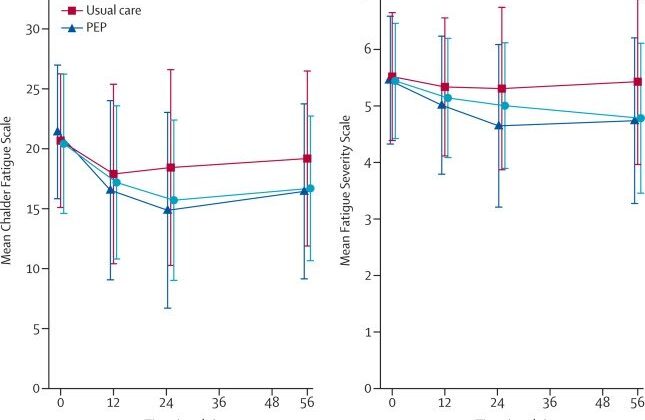
Physical activity and talking therapies can significantly improve fatigue in people with conditions such as rheumatoid arthritis, axial spondylitis and lupus, a new University of Aberdeen study has found.
These conditions, known collectively as inflammatory rheumatic diseases (IRD), affect around 800,000 people in the U.K. 80% of those live with fatigue every day, an extreme physical and mental tiredness which affects people’s ability to concentrate, go to work, and live independently, considered the most important symptom of IRD after pain.
The LIFT study provides new evidence that non-drug treatments like physical activity and cognitive behavioral therapy should be a core part of treating IRD in clinical practice. Previous studies have only looked at these treatments for fatigue in specific diseases.
“The fatigue really affects what you can do,” says Wendy Booth, 57, who lives with lupus and Sjögren’s syndrome. “If I do some work in the garden one day, I know I’ll pay for it the next. You really need to learn how to pace yourself but whilst I’ve tried, I’ve never really managed to hold back.”
Wendy received physical activity sessions as part of the LIFT study and has now joined a gym, saying she feels mentally and physical stronger than before: “The physio called me about once a fortnight and it really encouraged me. I feel like it [the LIFT study] helped give me purpose.”
The first-of-its-kind study, led by the universities of Aberdeen and Glasgow, compared three different types of care, as provided to 368 people with various inflammatory rheumatic diseases.
They found that telephone-delivered, personalized physical activity programs and cognitive behavioral approaches significantly improved fatigue among the study group when compared to those receiving usual care. The findings have been published in The Lancet Rheumatology.
The study by the University of Aberdeen and the University of Glasgow with the NHS and other academic partners, including the University of Manchester, Kings College London, Glasgow Caledonian University and the University of the West of England, is the largest to look at fatigue-specific interventions across a multitude of different IRD.
Study participants who were assigned personal physical activity programs received an average of five one-to-one 45-minute sessions over 30 weeks.
Those who received cognitive behavioral approaches received an average of eight sessions over the same period.
Both interventions were delivered by local NHS rheumatology health care professionals.
The group that received “usual care” received a Versus Arthritis education booklet on fatigue.
Participants who took part in the personal physical activity programs and cognitive behavioral approaches produced and maintained statistically and clinically significant reductions in the severity and impact of fatigue in a variety of IRD conditions. The benefits were maintained six months following completion of the courses of treatment.
Both interventions also improved participants’ sleep and mental health related quality of life.
Lead investigator, Professor Neil Basu who carried out the majority of the research at the University of Aberdeen, but now of the University of Glasgow, said: “Previous studies have looked at interventions such as these but in specific diseases only. Our study is unique in that it looks at the whole breadth of IRD and as such is more aligned with the demands that would be put on a rheumatology service. Moreover, it provides new evidence that some non-pharmacological interventions can be successfully and effectively delivered by non-specialist members of the clinical service.
“It has been encouraging to see that the interventions have led to improvements for participants even six months after the end of the treatment. It’s also great to see that these steps were impactful even when delivered via telephone. Since the onset of the pandemic, health care services are being re-imagined to incorporate greater remote care, however the evidence base to support this shift has generally been limited.”
Dr. Neha Issar-Brown, Director of Research and Health Intelligence at the charity Versus Arthritis, said: “Fatigue and chronic pain go hand in hand as the twin challenges for people living with inflammatory rheumatic diseases (IRDs) such as rheumatoid arthritis and lupus. But fatigue tends not to respond to medicines for these conditions, and often goes unrecognized by clinicians.
“There is an urgent and unmet need for more evidence-based interventions including better access to non-drug treatments like Cognitive Behavioral Therapies (CBT) and supported physical activity, so more people with IRD can retain their independence, stay in work, and enjoy better mental health, which we know these conditions can cruelly take away.
Source: Read Full Article
